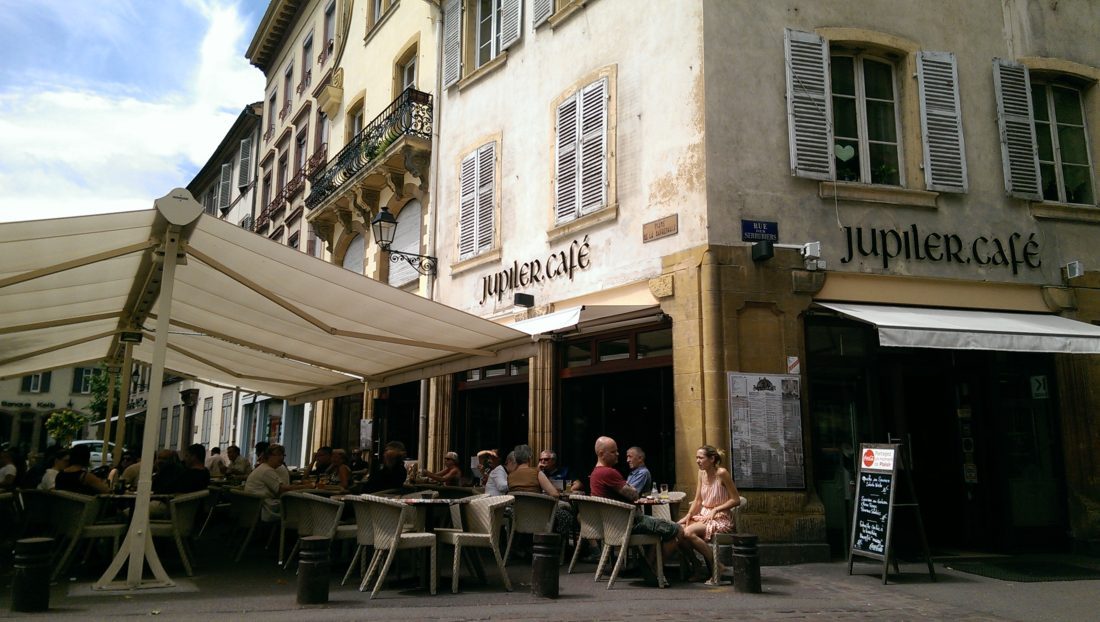In the early days of my wife and mine’s marriage, we went to France for a month.
It was everything France for a month should be.
Hours of breakfast and coffee. Beer in the early and late afternoon. Dinner where everything was good, and even if it wasn’t, it actually was because French voices were all around, and they’re the best seasoning there is.
Finally, the kind of night time walk where you don’t talk because words don’t belong under street lamps.
We were young, careless, healthy, in exciting love, and while we technically knew all that, we didn’t appreciate how rare a weather system that is.
Four weather phenomena met in one place, and we didn’t know those particular ones would never meet again in quite that same way – that we’d think about it one day like old locals who tell people about “The great hurricane of ’54.”
No doubt, you’ve had your own beautiful hurricane.
I’ve thought about that trip for many years.
What a beautiful memory.
Yes, but, strangely, what a sad one.
Sad, because it’s a beautiful time that’s gone. I’ve never quite known how people can visit a good memory and leave it happy.
When good things go, isn’t that by definition sad?
For the melancholy and depressed, good memories are sad ones. Bad memories are bad ones.
Which means all memories are invitations to sadness.
But the good ones have a deceptive sadness. We want to forget the bad memories, we want to process and rise stronger from them, there’s no debating that. That’s obvious.
The beautiful memories?
Something tells us that because these are good memories, we should revisit them.
The cards from loved ones who’ve passed away, the childhood memories, the song that can somehow bring back the loved one, the childhood memory, and everything else in two chords.
But anyone who’s indulged in disappeared beauty knows the disappeared can overwhelm the beauty and turn it into something that taunts more than loves.
That’s nostalgia, and nostalgia means an “aching for home” or the past, and Solomon knew how dangerous it is.
In Ecclesiastes, he says explicitly: “Don’t long for the ‘good old days.’ This is not wise.”
So how do we avoid living in nostalgia?
One trick, we’ve heard, is to focus on the beauty of the now.
But how can you appreciate the beautiful now, when you suddenly realize it will become the nostalgic yesterday?
There are some answers to this – mindfulness – don’t focus on the past or the future, just be present in the moment, and multiple studies even point to the positive effects of mindfulness.
If mindfulness helps you, by all means, do it.
But I also know many, including myself, who’ve gone down that path and been disillusioned by its inability to rescue us from the fact that we are, in fact, human beings who have a past and future, and without that sense of past and future, we would quite literally not be human, and it’s impossible to live life without that past informing your present and the future looming over it.
So what do we do?
We live now, yes, but only for later.
Some might call that “living for dreams,” but dreams are tricky for two reasons.
First, our dreams always involve our nostalgia. If you were to come up with a formula for dreams it would be this: Dreams = the best parts of our past + the one beautiful thing we never had, but still wish for.
So by definition, dreams are more wonderful than nostalgia, and they’re certainly more productive because they prod us into action.
But dreams can be devious.
If our dreams lie on earth, they might do us some good now by pushing us to achieve, but they will only disappoint later because the dream you climb every mountain for will inevitably just end up on a wall, where it will alternately love and taunt you.
So what dream do we follow?
Our hope in Christ, our dream of resurrection, is the only one that won’t turn into some sad bit of nostalgia, because heaven will be the One Good Thing that will never end, and so it will never become just a beautiful memory for your wall.
God would be a terrible God if our first five minutes in heaven were our best. Don’t the best books and movies just get better and better?
In heaven, we will never look back at something that is more beautiful than what’s right around the bend.
With God, there is no nostalgia. In fact, the most important part of our Christianity — our forgiveness — depends on Christ “remembering our sins no more.”
So here’s a thought that’s proven effective for me at beating back nostalgia, and I hope it helps you.
In his book The Hungering Dark, Frederick Buechner writes that we are all living on the Saturday after Good Friday.
That calls us to be grateful for Friday’s forgiveness, to live in the relief and joy of it.
But Saturday is also the day before our resurrection with Christ, and that calls us to be hopeful, to live our Saturday for Sunday.
In other words, we are all living on Saturday — some in a beautiful minute, others an ugly hour — but nothing about where we are changes the fact Christ died for us yesterday, and that we will rise to be forever with him tomorrow.
For me, that means telling Christ, “Lord, here is Saturday. I’m giving this day to you, because you gave me yourself on Friday, and you will give me resurrection and a new body on Sunday. But today is my sacrifice for you.”
So I say to myself and anyone else who battles melancholy over the past, if it’s Saturday afternoon or evening, why look back at our careless, carefree Saturday morning?
Maybe it was brighter than our afternoon, maybe the sun was still rising and not falling, but looking back only distracts us from the business of the rest of the day and pales compared to the wonder of our coming Sunday morning.
And Sunday morning will come.
That is the only dream that won’t disappoint.
The bitter beauty of nostalgia comes for me often, it still does, and always will.
But now, when I go there, I know I’m as irresponsible as Meursault, who knocked “four quick times on the door of unhappiness” and ruined his life.
The true but hard lesson is that nostalgia is an aching for home that only brings hurt, not home.
Forget the past — even its good — and live for Christ today, remembering that 12 AM Sunday morning is coming, and with it, all the beauty you’ve ever felt in the past, and some new kinds you won’t believe.
“And we know this hope will not lead to disappointment, for we know how dearly God loves us.” Romans 5:5.

Christian Heinze is editor of The Weary Christian.

